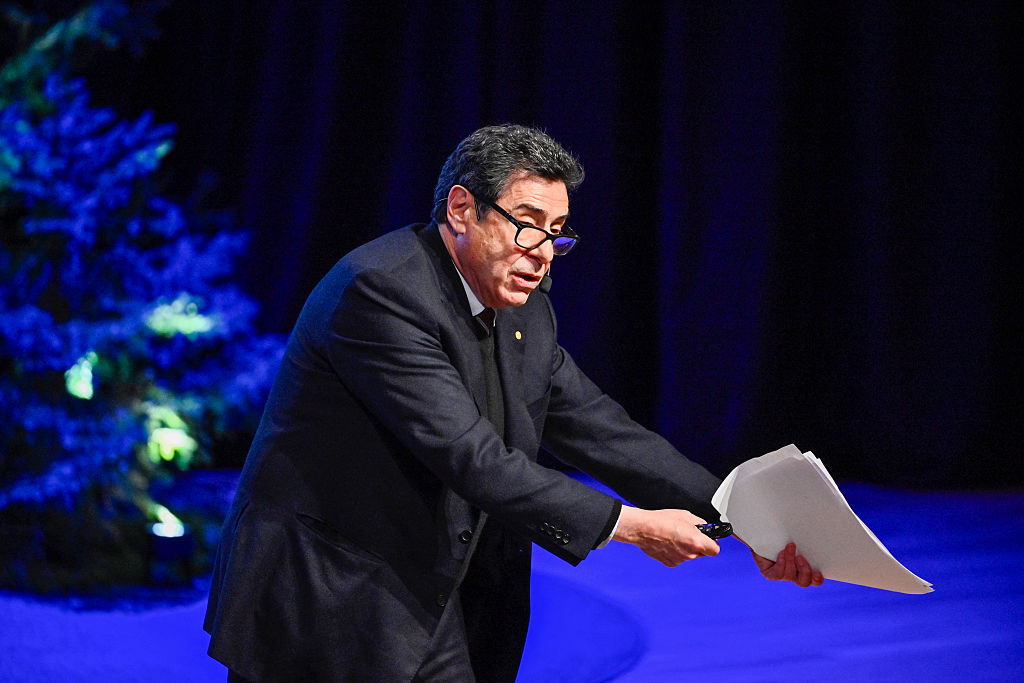The simple answer to Britain's staff shortages: raise wages
The UK's businesses are suffering from a shortage of staff. If they want to fix that, they'll have to do the one thing they really hate: raise wages


Get the latest financial news, insights and expert analysis from our award-winning MoneyWeek team, to help you understand what really matters when it comes to your finances.
You are now subscribed
Your newsletter sign-up was successful
Want to add more newsletters?

Twice daily
MoneyWeek
Get the latest financial news, insights and expert analysis from our award-winning MoneyWeek team, to help you understand what really matters when it comes to your finances.

Four times a week
Look After My Bills
Sign up to our free money-saving newsletter, filled with the latest news and expert advice to help you find the best tips and deals for managing your bills. Start saving today!
The UK appears to be booming. You can see it in the official data, but it’s just as obvious in the anecdotal that there don’t appear to be enough staff to keep up with demand. This week alone The Observer wrote on a restaurant in St Albans short of 20 of its normal number of employees (55); The Sunday Times featured a brave entrepreneur setting up a new chain (Tapas Revolution) and struggling to find the 25 chefs and waiting staff he needs; The Times said that in Devon “millionaire hotelier” Giles Fuchs is washing his own dishes; and The Daily Telegraph noted that Le Gavroche in Mayfair is to suspend lunch service due to staff shortages. The Sunday Times sent two young people on a quest to see how many firm job offers they could get in 24 hours. One got nine; the other six. Not bad.
Overall, says trade body UKHospitality, there is a shortfall of 188,000 hospitality workers in the UK. Some of this is due to many workers still being tied up in furlough (well over two million). Some may also reflect changing attitudes to work – 810,000 new firms were started in the UK in the year to end-March (up 22% on the year before). Founders aren’t usually also employees. Still, even if it turns out to be temporary (some furlough will turn into redundancy and around 60% of new businesses fail in year one), it’s little wonder wage pressures are rising: employers are offering sign-on bonuses, extra cash for bringing in a mate and, in one case, monthly hampers for those that stay, plus the promise of future vineyard visits.
This is what employers tend to do before they do the one thing they really hate (it’s hard to roll back) but that actually works – put up wages. You might at this point recall the pre-Brexit era when we were told that the opposite was not true – that the surge in the UK labour supply after we introduced full freedom of movement in 2004 was not holding wages down. Definitely not. But we’ll gloss over that for now.
MoneyWeek
Subscribe to MoneyWeek today and get your first six magazine issues absolutely FREE

Sign up to Money Morning
Don't miss the latest investment and personal finances news, market analysis, plus money-saving tips with our free twice-daily newsletter
Don't miss the latest investment and personal finances news, market analysis, plus money-saving tips with our free twice-daily newsletter
We’re still going to need oil
Back to the V-shaped recovery: our services sector (which makes up 80% of the UK economy) grew at its fastest pace for 25 years in May. Construction and manufacturing are booming too – most forecasts now have GDP rising at 7%-plus this year. If your brain isn’t flashing inflation warnings yet (it should be), consider how much energy growth takes, and where that energy might come from. There’s a reason metals prices are rising (renewable-energy creation is very metals-heavy). And there’s a reason oil prices are rising – we use a lot of it and will do for a long time yet. One of the best stories of our age is the spat between outdoor wear group The North Face and oil-services company Innovex. The latter ordered 400 jackets from the former for its staff. North Face rejected the order – Innovex wanted to put its logo on the jackets; North Face did not want to be associated with them. The Innovex CEO took his revenge by noting that not only are most North Face products made at least in part from hydrocarbons, but that without oil and gas there would, for now at least, be no skiing, kayaking or mountain climbing.
A reminder that despite all the environmental grandstanding, we still need fossil fuels – and that we’d be wise to recognise that in our portfolios. If inflation is coming you may get a hamper and a raise. But we think you’ll want to hold commodities too.
Get the latest financial news, insights and expert analysis from our award-winning MoneyWeek team, to help you understand what really matters when it comes to your finances.

-
 MoneyWeek news quiz: Can you get smart meter compensation?
MoneyWeek news quiz: Can you get smart meter compensation?Smart meter compensation rules, Premium Bonds winners, and the Bank of England’s latest base rate decision all made the news this week. How closely were you following it?
-
 Adventures in Saudi Arabia
Adventures in Saudi ArabiaTravel The kingdom of Saudi Arabia in the Middle East is rich in undiscovered natural beauty. Get there before everybody else does, says Merryn Somerset Webb
-
 Rachel Reeves is rediscovering the Laffer curve
Rachel Reeves is rediscovering the Laffer curveOpinion If you keep raising taxes, at some point, you start to bring in less revenue. Rachel Reeves has shown the way, says Matthew Lynn
-
 The enshittification of the internet and what it means for us
The enshittification of the internet and what it means for usWhy do transformative digital technologies start out as useful tools but then gradually get worse and worse? There is a reason for it – but is there a way out?
-
 What turns a stock market crash into a financial crisis?
What turns a stock market crash into a financial crisis?Opinion Professor Linda Yueh's popular book on major stock market crashes misses key lessons, says Max King
-
 ISA reforms will destroy the last relic of the Thatcher era
ISA reforms will destroy the last relic of the Thatcher eraOpinion With the ISA under attack, the Labour government has now started to destroy the last relic of the Thatcher era, returning the economy to the dysfunctional 1970s
-
 Why does Trump want Greenland?
Why does Trump want Greenland?The US wants to annex Greenland as it increasingly sees the world in terms of 19th-century Great Power politics and wants to secure crucial national interests
-
 Nobel laureate Philippe Aghion reveals the key to GDP growth
Nobel laureate Philippe Aghion reveals the key to GDP growthInterview According to Nobel laureate Philippe Aghion, competition is the key to innovation, productivity and growth – here's what this implies for Europe and Britain
-
 'Investors should brace for Trump’s great inflation'
'Investors should brace for Trump’s great inflation'Opinion Donald Trump's actions against Federal Reserve chair Jerome Powell will likely stoke rising prices. Investors should prepare for the worst, says Matthew Lynn
-
 The state of Iran’s collapsing economy – and why people are protesting
The state of Iran’s collapsing economy – and why people are protestingIran has long been mired in an economic crisis that is part of a wider systemic failure. Do the protests show a way out?